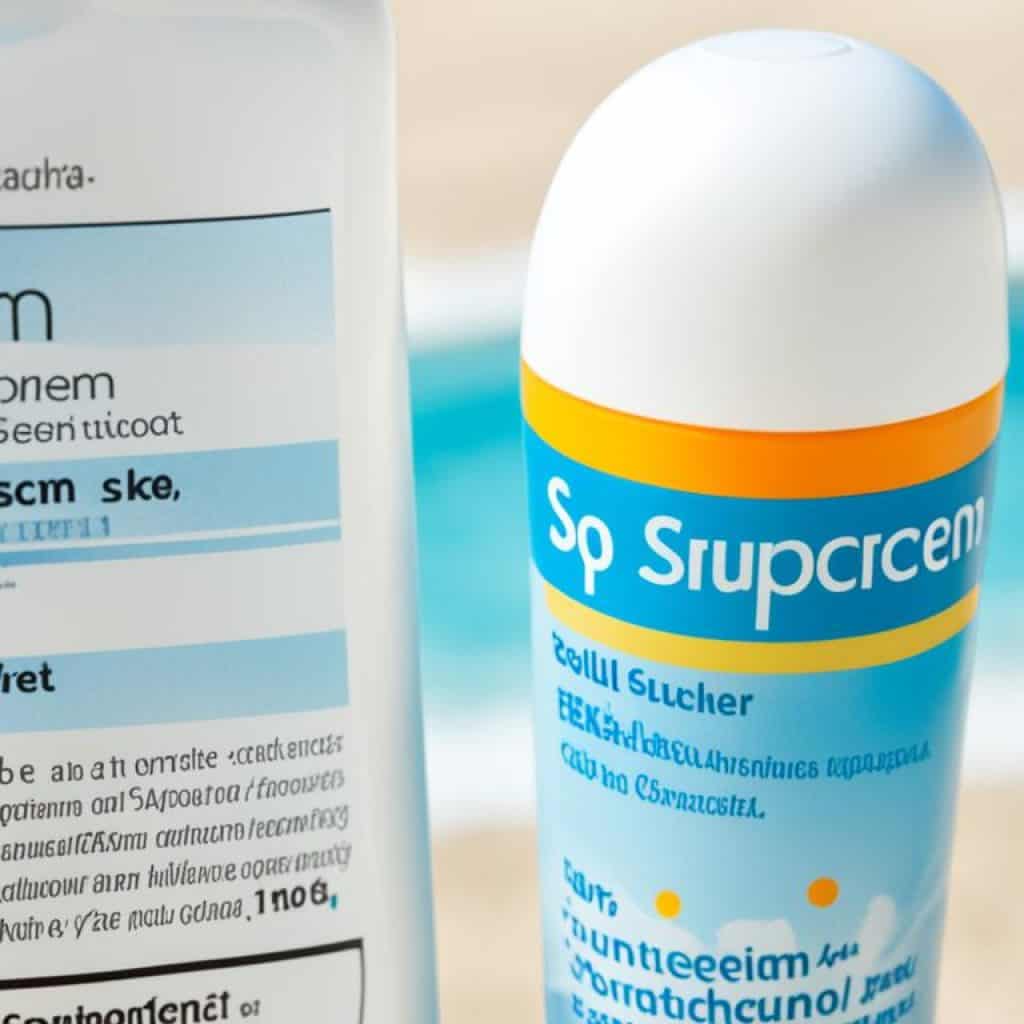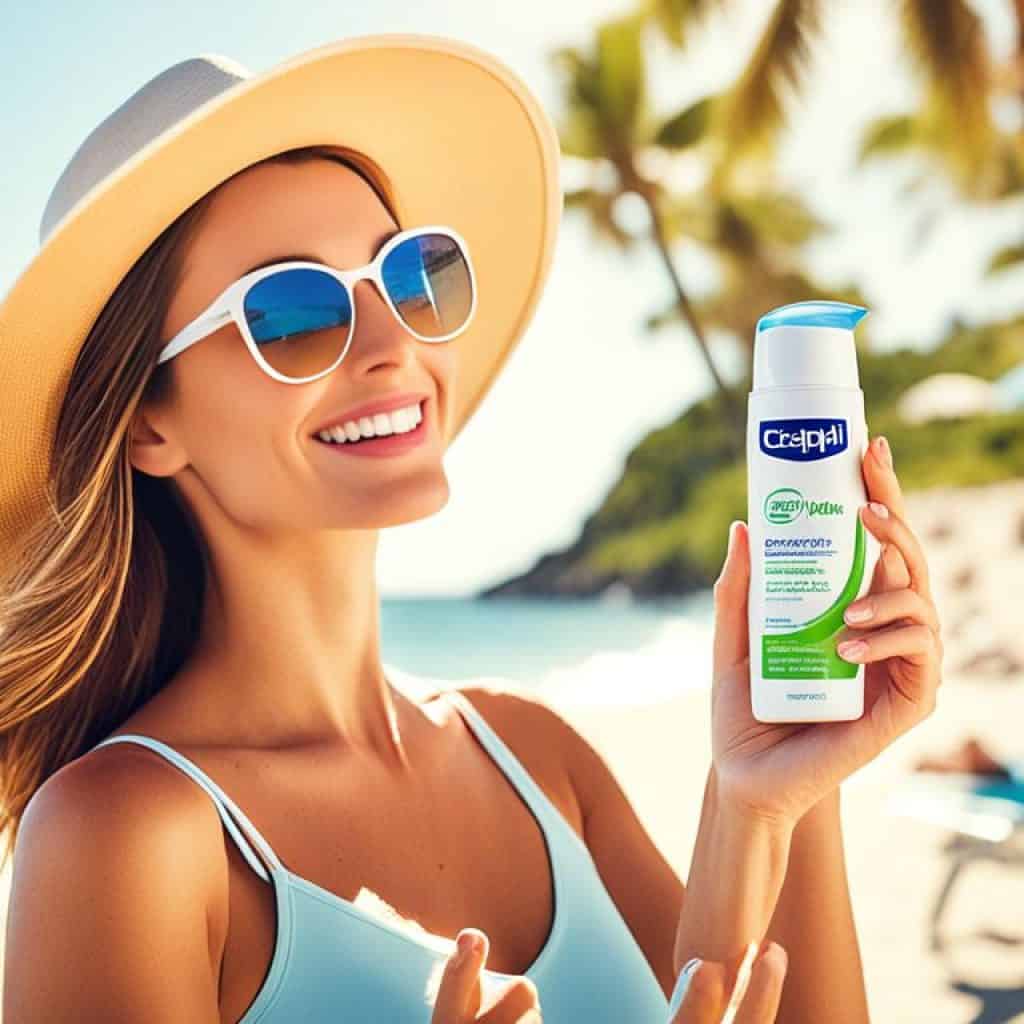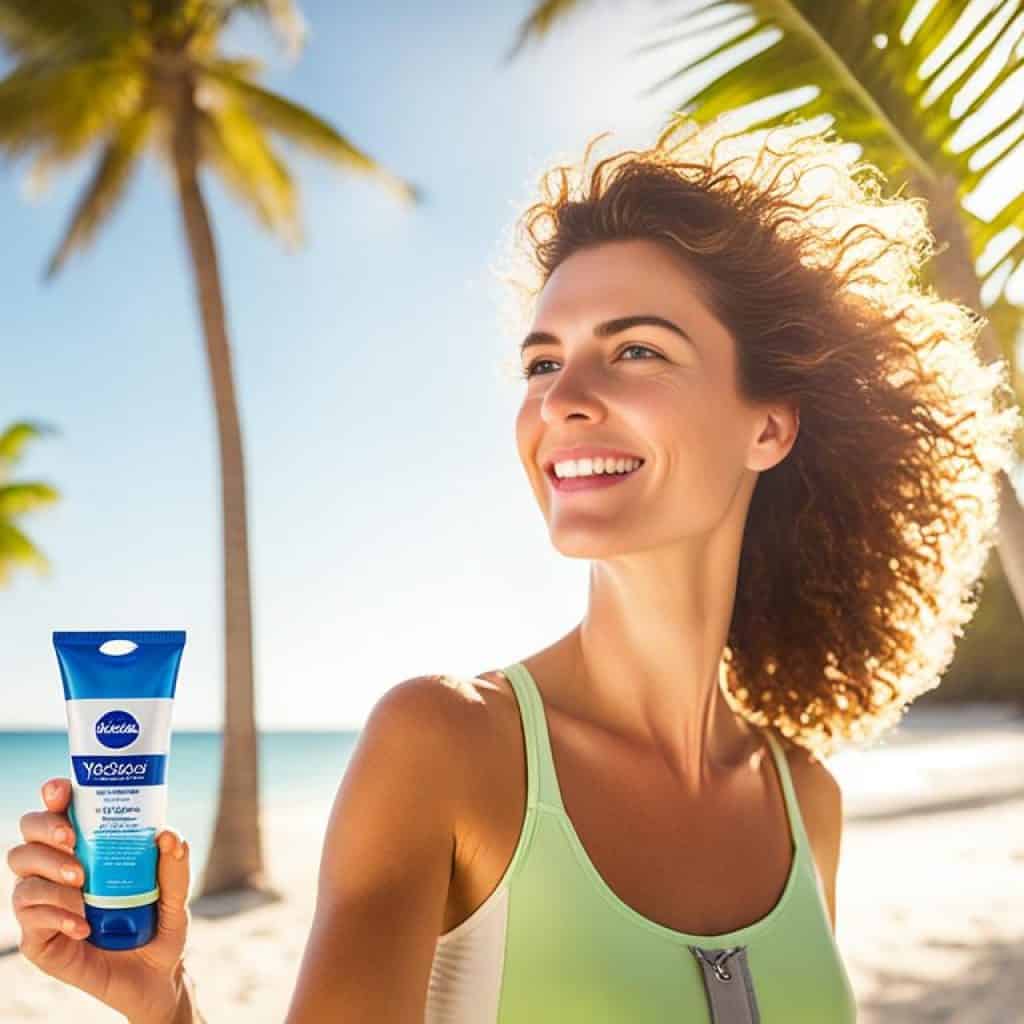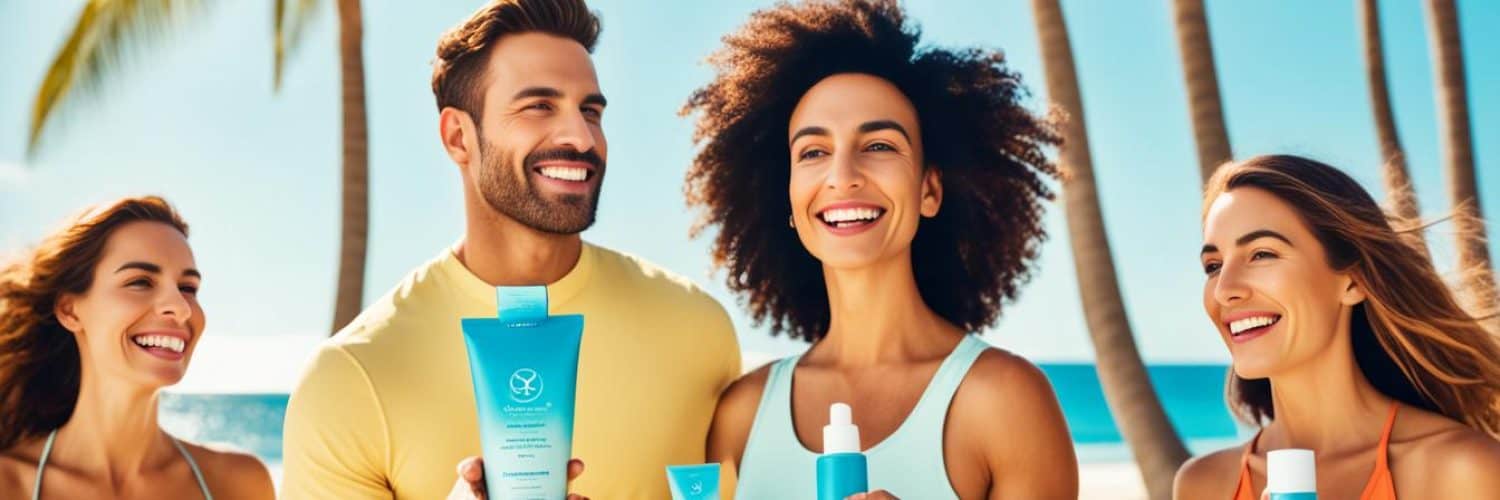Are you looking for the best sunscreen in the Philippines? With so many sun protection products on the market, it can be overwhelming to find the perfect sunscreen that suits your needs. But here’s a question to consider: do you know which sunscreen is truly the best for your skin?
In this article, we will provide you with a curated list of the top-rated sunblocks available in the Philippines. We’ll also give you helpful recommendations, discuss the importance of UV protection in the Philippines, and share key insights about SPF for Filipino skin. Get ready to discover the best sunscreens for Pinoy skin and challenge common beliefs about sunscreen choices!
- Choosing the right sunscreen is crucial for protecting your skin from the harmful effects of the sun.
- Consider factors such as SPF, broad-spectrum coverage, formulation, and your skin type when selecting a sunscreen.
- Philippine sunscreen recommendations can help guide your decision in finding the best sunscreen for your needs.
- Don’t settle for just any sunscreen – find the one that offers the best UV protection for the tropical weather in the Philippines.
- Stay tuned to discover the top sunscreens that have received rave reviews in the Philippines!
Takeaways>
How to Choose a Body Sunscreen – Buying Guide
Choosing the right body sunscreen is crucial for protecting your skin from the harmful effects of the sun. With so many options available, it can be overwhelming to determine which one is best for you. This buying guide will walk you through the essential factors to consider when selecting a body sunscreen to ensure optimal sun protection and skin care.
Sun Protection Factor (SPF)
The sun protection factor (SPF) indicates how well a sunscreen can protect you from the sun’s ultraviolet (UV) rays. It’s important to choose a sunscreen with an appropriate SPF for your needs. The American Academy of Dermatology recommends using a sunscreen with at least SPF 30. This level of SPF blocks 97% of the sun’s UVB rays and provides adequate protection against sunburn and skin aging.
Broad-Spectrum Sunscreen
When selecting a body sunscreen, look for one that offers broad-spectrum protection. This means it guards against both UVA and UVB rays. UVA rays can penetrate the deeper layers of your skin and contribute to premature aging and skin damage. UVB rays are responsible for sunburn. Opting for a broad-spectrum sunscreen ensures comprehensive protection against both types of rays.
Formulation
The formulation of a sunscreen refers to its texture, consistency, and application method. There are various formulations available, including lotions, creams, gels, and sprays. Choose a formulation that suits your preferences and skin type. Lotions and creams work well for dry or sensitive skin, while gels and sprays are lightweight and non-greasy, making them suitable for oily or combination skin.
Skin Type and Needs
Your specific skin type and needs should also play a role in your sunscreen selection. If you have acne-prone skin, opt for sunscreens specially formulated for acne-prone skin to avoid clogged pores. Those with dry skin can benefit from hydrating sunscreens that provide additional moisture. Individuals with sensitive skin should look for sunscreens labeled as gentle and hypoallergenic. Consider any other specific skin concerns or sensitivities you may have when choosing a sunscreen.
Physical or Chemical Sunscreen
Body sunscreens can be categorized as either physical or chemical. Physical sunscreens contain mineral ingredients like zinc oxide and titanium dioxide, which create a physical barrier on the skin to reflect or scatter UV rays. Chemical sunscreens, on the other hand, work by absorbing UV rays and converting them into heat. Choose between physical and chemical sunscreen based on your preference and any concerns you may have regarding sunscreen ingredients.
Water-Resistant Sunscreen
If you plan on spending time in the water or participating in outdoor activities that involve sweating, it’s important to choose a water-resistant sunscreen. Water-resistant sunscreens maintain their effectiveness even when exposed to water or sweat. They provide added protection during activities such as swimming or beach trips, ensuring your skin remains shielded from the sun.
By considering these factors – SPF, broad-spectrum protection, formulation, skin type, physical or chemical, and water resistance – you can narrow down your choices to find the perfect body sunscreen that meets your sun protection needs and keeps your skin healthy and safe.
Know How Much Sun Protection Factor You Need
The Sun Protection Factor (SPF) is a crucial factor to consider when choosing a sunscreen. SPF measures how effective a sunscreen is in blocking Ultraviolet B (UVB) radiation from the sun, which is responsible for sunburn and skin aging. Dermatologists recommend using a sunscreen with at least SPF 30 to provide adequate protection.
Sunburn and skin aging are two common concerns caused by UVB rays.
SPF 30 blocks about 97% of UVB rays, significantly reducing the risk of sunburn and long-term skin damage. However, it’s important to note that no sunscreen can provide 100% protection. Higher SPFs, such as SPF 50 or SPF 100, offer additional protection, especially for fair skin or prolonged sun exposure.
Dermatologists advise individuals to reapply sunscreen every two hours or more frequently when sweating or swimming to maintain its effectiveness.
Now, let’s take a closer look at the different levels of SPF:
| SPF | Percentage of UVB Rays Blocked |
|---|---|
| SPF 15 | 93% |
| SPF 30 | 97% |
| SPF 50 | 98% |
| Benefits of Higher SPF |
|---|
| Extra Protection: Higher SPFs provide additional defense against UVB rays for extended periods of sun exposure. |
| Fair Skin: People with fair skin are more susceptible to sunburn and should opt for higher SPFs. |
| Longer Lasting: Higher SPFs offer longer-lasting protection, reducing the need for frequent reapplication. |
Remember, it’s always best to consult with a dermatologist to determine the most suitable SPF for your skin type and specific needs.
Look for “Broad-Spectrum” on the Label for Protection Against UVA
When it comes to protecting your skin from the harmful effects of the sun, it’s important to understand the difference between UVA and UVB rays. While both types of rays can cause skin damage, UVA rays penetrate deeper into the skin and are responsible for long-term skin aging and damage.
To ensure comprehensive protection against both UVA and UVB rays, look for a sunscreen labeled as “broad-spectrum.” This indicates that the sunscreen is formulated to shield your skin from both types of rays, safeguarding the inner cells in the top layer of your skin from harm.

Why is it important to protect your skin from UVA rays?
UVA rays can penetrate glass and clouds, meaning they can reach your skin even on cloudy days or when you’re indoors. These rays are present all year round, despite fluctuations in UVB intensity. Constant exposure to UVA rays can lead to premature aging, sunspots, and an increased risk of skin cancer.
By choosing a broad-spectrum sunscreen, you can protect your skin from the damaging effects of UVA rays, helping to maintain healthy, youthful-looking skin throughout the year.
| Comparing Broad-Spectrum and Non-Broad-Spectrum Sunscreens | |
|---|---|
| Broad-Spectrum Sunscreen | Non-Broad-Spectrum Sunscreen |
| Protects against both UVA and UVB rays | May only protect against UVB rays |
| Reduces the risk of premature aging | Limited protection against skin aging |
| Helps prevent sunspots and hyperpigmentation | No UVA ray protection |
| Minimizes the risk of skin cancer | May not address the UVA ray exposure |
Choosing a broad-spectrum sunscreen is an essential step in your skincare routine to ensure your skin remains protected from both UVA and UVB rays. Don’t forget to check the label and opt for broad-spectrum sunscreen for comprehensive sun protection.
Select the Formulation That Will Cater to Your Preferences
When it comes to choosing a sunscreen, the formulation plays a crucial role in your overall experience. Sunscreens are available in different types such as lotions, creams, gels, and sprays, each offering its own unique benefits.
Lotions: Lotions are a popular choice and are known for their smooth texture and easy application. They are generally more hydrating and provide a soothing feel to the skin. Lotions are suitable for those with normal to dry skin.
Creams: Creams are thicker in consistency and provide intense moisturization. They are ideal for individuals with dry or mature skin, as they help lock in moisture and prevent dryness.
Gels: Gels have a lightweight and non-greasy texture, making them a preferred choice for those with oily or combination skin. Gels absorb quickly into the skin, leaving a matte finish without any residue.
Sprays: Sprays offer a convenient and easy application method, especially for areas that are hard to reach. They provide a lightweight and refreshing feel on the skin. Just ensure proper coverage by applying an even layer.
Choose a formulation that suits your preferences in terms of texture, consistency, and application method. Whether you prefer a lightweight gel or a moisturizing cream, there’s a sunscreen formulation that will cater to your needs.
Remember, the key is to find a sunscreen that you’ll enjoy applying daily, ensuring consistent use for optimal sun protection.
| Sunscreen Formulation | Key Features | Suitable for |
|---|---|---|
| Lotions | Smooth texture, easy application, hydrating | Normal to dry skin |
| Creams | Thicker consistency, intense moisturization | Dry or mature skin |
| Gels | Lightweight, non-greasy, quick absorption | Oily or combination skin |
| Sprays | Convenient, easy application, refreshing | All skin types |
Consider Your Skin Type and Needs
When choosing a sunscreen, it is crucial to consider your skin type and specific needs. To ensure maximum protection without causing any adverse effects, opt for a sunscreen that caters to your unique requirements.
Sunscreen for Acne-Prone Skin
If you have acne-prone skin, it is essential to choose a sunscreen that won’t clog your pores or exacerbate breakouts. Look for non-comedogenic or oil-free sunscreens specially formulated for acne-prone skin. These sunscreens provide the necessary protection while being gentle on your skin.
Hydrating Sunscreen for Dry Skin
For those with dry skin, a hydrating sunscreen is a must. Look for sunscreens that offer moisturizing properties, as they help to replenish and nourish your skin while protecting it from the sun’s harmful rays. These sunscreens typically contain ingredients like hyaluronic acid or glycerin to keep your skin hydrated throughout the day.
Sunscreen for Sensitive Skin
If you have sensitive skin, it’s essential to choose a sunscreen specifically formulated for this skin type. Look for sunscreens that are hypoallergenic, fragrance-free, and free from any potential irritants. These sunscreens are gentle on your skin and minimize the risk of irritation or allergic reactions.
Sunscreen for Oily Skin
Individuals with oily skin can benefit from oil-free or mattifying sunscreens. These sunscreens help control excess oil production and prevent a greasy appearance on the skin. Look for lightweight formulas that won’t clog your pores or feel heavy on your skin.
Addressing Skin Sensitivities
Some individuals may have specific skin sensitivities or conditions that require extra care when choosing a sunscreen. If you have skin sensitivities like rosacea or eczema, consult with a dermatologist to find a sunscreen that addresses your specific needs.
Remember, finding the right sunscreen for your skin type and needs is crucial for effective protection and overall skin health.
Pick Between Physical or Chemical Sunscreen
When it comes to choosing a sunscreen, you have the option of two main types: physical and chemical sunscreens. Understanding the differences between the two can help you make an informed decision based on your preferences and concerns.
Physical Sunscreen:
A physical sunscreen, also known as a mineral sunscreen, contains ingredients such as zinc oxide and titanium dioxide. These minerals create a physical barrier on the skin that reflects or scatters UV rays away from the skin’s surface. The key advantage of physical sunscreens is that they provide immediate protection upon application.
Physical sunscreens are less likely to irritate the skin and are suitable for individuals with sensitive skin. They are also considered safer for the environment and are reef-friendly. The use of mineral ingredients like zinc oxide and titanium dioxide ensures that the sunscreen is not only protecting your skin but also minimizing potential harm to marine life.
Chemical Sunscreen:
Chemical sunscreens, on the other hand, work by absorbing UV rays and converting them into heat. These sunscreens contain organic compounds that create a chemical reaction when exposed to UV light. The absorption of UV rays by chemical sunscreens allows the skin to be protected from sun damage.
Chemical sunscreens often have a thinner consistency and may be more suitable for daily use due to their lightweight and non-greasy formula. However, it’s essential to note that some individuals with sensitive skin may experience irritation or allergic reactions to the chemical ingredients in these sunscreens. If you have any concerns or sensitivities, consult with a dermatologist before selecting a chemical sunscreen.
Before deciding on a physical or chemical sunscreen, consider the following:
- Your skin type and any specific concerns or sensitivities
- Your preference for immediate protection (physical sunscreen) or thinner consistency (chemical sunscreen)
- The potential environmental impact of chemical sunscreens
To make an informed decision, it’s vital to read sunscreen labels, research the ingredients, and choose the product that aligns with your needs and values.
A physical sunscreen creates a physical barrier on the skin, reflecting or scattering UV rays, while a chemical sunscreen absorbs UV rays and converts them into heat.
Remember, regardless of whether you choose a physical or chemical sunscreen, the most important factor is consistent sun protection. Apply sunscreen generously and reapply every two hours, especially when spending prolonged periods in the sun.
Opt for a Water-Resistant Sunscreen
When it comes to enjoying outdoor activities that involve water or excessive sweating, it’s crucial to protect your skin with a water-resistant sunscreen. These specialized sunscreens provide extended protection even when in contact with water or sweat, ensuring that you stay shielded from the sun’s harmful rays.
Whether you’re planning a beach trip, engaging in swimming sessions, or participating in other outdoor activities, a water-resistant sunscreen is your reliable companion. It stays put even in challenging conditions, giving you the confidence to enjoy your time under the sun without worrying about sunburn or skin damage.
Water-resistant sunscreens are formulated to adhere to your skin even when wet. They create a protective barrier that locks in the active ingredients, allowing continuous and effective sun protection. Whether you’re swimming in the ocean, playing water sports, or simply sweating during vigorous outdoor exercises, a water-resistant sunscreen ensures that your skin remains shielded throughout.
Beach enthusiasts can confidently go for a dip in the water, knowing that their water-resistant sunscreen won’t wash away easily. Swimmers can enjoy their time in the pool without worrying about frequent reapplication. Outdoor adventurers engaging in activities that make them sweat can rest assured that their sunscreen won’t slide off their skin.
When selecting a water-resistant sunscreen, it’s important to check the product labels for the specific duration of water resistance. Some sunscreens are labeled as “water-resistant” for up to 40 or 80 minutes, indicating how long they remain effective in water or while sweating. Remember to reapply after the specified time or as needed to maintain optimal protection.
Don’t let water or excessive sweating compromise your sun protection. Choose a high-quality water-resistant sunscreen to keep your skin safeguarded during all your outdoor adventures.
Key Points:
- Water-resistant sunscreens provide extended protection even when in contact with water or sweat.
- They are ideal for beach trips, swimming, and other outdoor activities.
- Water-resistant sunscreens stay put on the skin, ensuring continuous sun protection.
- Check the product labels for the specific duration of water resistance and reapply as needed.
Nivea | Nivea Sun Protect and Moisture Lotion
Nivea Sun Protect and Moisture Lotion is a trusted sunscreen that provides excellent sun protection while keeping your skin moisturized. This lightweight and non-greasy formula make it perfect for everyday use, allowing you to stay protected without the heavy, sticky feeling.
With its broad-spectrum UVA and UVB protection, Nivea Sun Protect and Moisture Lotion shields your skin from harmful rays that can cause sunburn and premature aging. Whether you’re spending a day at the beach or running errands under the sun, this sunscreen offers reliable defense against the damaging effects of UV radiation.
What sets Nivea Sun Protect and Moisture Lotion apart is its moisturizing properties. Unlike other sunscreens that can leave your skin dry and dull, this lotion keeps your skin hydrated throughout the day. It nourishes and replenishes your skin’s moisture, making it a great choice for those with dry or dehydrated skin.
Additionally, Nivea Sun Protect and Moisture Lotion is dermatologically tested, ensuring its safety and effectiveness on various skin types. It is suitable for both men and women, and its light fragrance adds a refreshing touch to your sun care routine.
Stay protected and maintain healthy, moisturized skin with Nivea Sun Protect and Moisture Lotion. Make it a part of your daily skincare regimen to enjoy the benefits of sun protection and hydration in one convenient product.
| Product | Features |
|---|---|
| Nivea Sun Protect and Moisture Lotion |
|
Cetaphil | Light Gel Sunscreen
Looking for a lightweight and non-greasy sunscreen that provides effective sun protection? Look no further than Cetaphil Light Gel Sunscreen. This gel-based sunscreen is specially formulated to give you the protection you need without weighing down your skin.
With its unique gel texture, Cetaphil Light Gel Sunscreen is incredibly lightweight and absorbs quickly into the skin. Say goodbye to the heavy and sticky feeling that often comes with traditional sunscreens.
Whether you have dry, oily, or sensitive skin, Cetaphil Light Gel Sunscreen is suitable for all skin types. Its gentle formula ensures that your skin remains comfortable and protected throughout the day.
Not only is Cetaphil Light Gel Sunscreen lightweight and non-greasy, but it also offers water resistance. This means that you can enjoy outdoor activities without worrying about your sunscreen washing off.
Make Cetaphil Light Gel Sunscreen a part of your daily skincare routine and stay protected from the sun’s harmful rays. Say goodbye to heavy sunscreens and hello to lightweight, non-greasy sun protection!

Key Features:
- Gel-based sunscreen
- Lightweight and non-greasy
- Suitable for all skin types
- Water-resistant
Belo | Reef-Friendly Sunscreen
Belo Reef-Friendly Sunscreen is not only effective in providing sun protection but also environmentally friendly. It is specially formulated to be reef-safe, minimizing the impact on marine life. This sunscreen offers broad-spectrum UVA and UVB protection.
| Key Features | Benefits |
|---|---|
| Reef-friendly formula | Minimizes impact on marine life |
| Broad-spectrum UVA and UVB protection | Protects against harmful sun rays |
| Water-resistant | Provides long-lasting protection, even during water activities |
| Non-greasy | Leaves a lightweight and comfortable feel on the skin |
Protect yourself from the sun while protecting the environment with Belo Reef-Friendly Sunscreen. Its reef-friendly formula ensures that you can enjoy the beach without damaging the delicate marine ecosystem. With its broad-spectrum UVA and UVB protection, you can confidently bask under the sun while shielding your skin from harmful rays.
“Choose Belo Reef-Friendly Sunscreen for effective sun protection that goes beyond just your skin. By opting for ocean-friendly sunscreen, you can help preserve the beauty of our seas and coral reefs.” – Dr. Sophia Mendez, Dermatologist
Anessa | Whitening UV Sunscreen Gel
Anessa Whitening UV Sunscreen Gel is a popular choice for those looking for both sun protection and skin brightening benefits. This sunscreen is known for its lightweight and fast-absorbing formula, leaving a matte finish on the skin. It offers broad-spectrum UVA and UVB protection.
If you’re searching for a sunscreen that not only shields your skin from harmful UV rays but also helps brighten your complexion, look no further than Anessa Whitening UV Sunscreen Gel. With its advanced formula, this sunscreen offers the perfect blend of sun protection and skin-enhancing benefits.
Lightweight and Fast-Absorbing
Anessa Whitening UV Sunscreen Gel is known for its lightweight texture, making it feel weightless on the skin. It absorbs quickly, allowing for easy and comfortable application. Say goodbye to heavy, greasy sunscreens and hello to a refreshing and breathable formula.
Matte Finish
This sunscreen leaves your skin with a smooth and matte finish, making it perfect for those who prefer a shine-free look. Whether you’re going about your daily activities or enjoying outdoor adventures, the matte finish of Anessa Whitening UV Sunscreen Gel ensures a non-greasy and natural appearance.
Broad-Spectrum Protection
With its broad-spectrum UVA and UVB protection, Anessa Whitening UV Sunscreen Gel safeguards your skin against harmful rays. It helps prevent sunburn, premature aging, and other sun-related skin damage. Feel confident and reassured knowing that your skin is shielded from the sun’s harmful effects.
Experience the combined benefits of sun protection and skin brightening with Anessa Whitening UV Sunscreen Gel. Its lightweight, fast-absorbing formula and matte finish make it a pleasure to wear, while its broad-spectrum protection keeps your skin safe from UV damage.
Vaseline | Daily Sun Cream
Vaseline Daily Sun Cream is a moisturizing sunscreen that is suitable for everyday use. It provides effective sun protection while keeping your skin hydrated and nourished. This sunscreen is specifically designed to be lightweight and non-greasy, making it a convenient option for daily sun protection.

Key Features:
- Moisturizing formula
- Lightweight and non-greasy
- Provides sun protection for daily use
The Vaseline Daily Sun Cream is formulated with moisturizing ingredients that help to maintain your skin’s natural moisture balance. This ensures that your skin stays hydrated throughout the day, even in the harsh sun. Its lightweight and non-greasy texture make it perfect for everyday wear, allowing you to go about your daily activities without any discomfort.
This moisturizing sunscreen is ideal for those who want to protect their skin from the sun’s harmful rays while keeping it moisturized and healthy.
With its broad-spectrum protection, Vaseline Daily Sun Cream shields your skin from both UVA and UVB rays, preventing sunburn and skin damage. It is essential to apply sunscreen daily, as sun exposure can occur even on cloudy days. By incorporating this sunscreen into your daily skincare routine, you can ensure that your skin stays protected from the damaging effects of the sun.
Conclusion
In conclusion, selecting the right sunscreen is crucial for safeguarding your skin from the harmful effects of the sun. With a plethora of options available, it’s important to consider various factors such as the sun protection factor (SPF), broad-spectrum coverage, formulation, skin type, and individual needs.
The top 10 sunscreens recommended in this article provide a diverse range of choices to meet different preferences and requirements when it comes to sun protection. Whether you’re looking for the best sunscreen in the Philippines, top-rated sunblock, or sun protection products specifically designed for Pinoy skin, this comprehensive list has got you covered.
Don’t let the tropical weather deter you from enjoying the outdoors. By using these recommended sunscreens, you can confidently face the Philippine sun and its UV rays without worrying about the potential harm it may cause. Stay safe, protected, and keep your skin healthy with the right sunscreen for your needs.


















Add comment